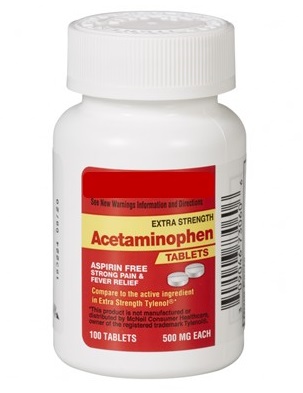By: Ruth Abi, B. Pharm. Freelance Health Writer and Datelinehealth Africa Volunteer. Review by; Chinedu Akpa. B. Pharm.

Bottle of acetaminophen (paracetamol) tablets
Before you write off this information because you think it is “just” acetaminophen (paracetamol), did you know that exceeding the prescribed dose of pain medications like paracetamol has a serious adverse effect of liver toxicity? Now that I have your attention, let’s get started!
That a drug is commonly used does not change the fact that it is a drug. Paracelsus says it perfectly: “All drugs are poisons, the benefit depends on the dosage.”
The purpose of this article is to educate readers on the appropriate use of common pain medications like acetaminophen.
Acetaminophen is a pain reliever and helps to relieve fever. It is used in the treatment of mild to moderate pain. In severe pain, it is used with stronger pain killers called opioids. Some conditions acetaminophen is capable of treating include: headaches, body aches, toothache, menstrual cramps, sore throat and fever. [1]
It was formerly believed that acetaminophen relieves pain by inhibiting an enzyme called cyclooxygenase (COX). But, current research suggests that acetaminophen gets converted into a chemical called N-acetylphenolamine (AM404). AM404 then interacts with two receptor sites in the brain:
(i) Transient receptor potential vaniloid 1 (TRPV1)
(ii) Cannabinoid 1 (CB1)
Receptors are like sensory organs in the cell membrane. They bind to specific substances outside the cell membrane and cause specific effects in the cell.
Asides its activity on the brain, acetaminophen also acts on the spinal cord. Acetaminophen is not effective against inflammation because its inhibition of cyclooxygenase is weak. [2]
Acetaminophen should be taken as written on the label, or as prescribed by a physician.
For kids less than 12 years old, a syrup is mostly used orally.
For each of the above, do not give more than 4 doses in 24 hours. [1]
Acetaminophen is mostly taken when necessary to relieve pain. If you missed a dose, you can take it when you remember. But, if it is almost time for your next dose, skip the dose you missed. Do not take more of the drug because you are trying to make up for the dose you missed. [1]
Some common adverse effects of oral or rectal acetaminophen include: [4]
Other side effects that accompany intravenous administration of acetaminophen include: [4]
An overdose of acetaminophen can cause symptoms such as loss of appetite, stomach pain, nausea, vomiting, sweating, weakness and confusion. Other symptoms that occur later may include pain in the upper stomach, dark urine, and yellowing of the skin or the white part of your eyes. Seek urgent medical assistance if you take an overdose of acetaminophen. [1]
In conclusion, you are now better informed with essential facts about acetaminophen; from its use, to dosage guidelines, potential side/adverse effects and drug interactions.
The knowledge you have should help you make use of acetaminophen safely and effectively. Remember to always consult a healthcare professional if you have questions or concerns.
1. Drugs.com. Acetaminophen Uses, Dosage & Side Effects. [Internet] Last updated 2023 Aug. 6. Cited August 15, 2024. Available from here.
2. Ohashi, N., & Kohno, T. Analgesic Effect of Acetaminophen: A review of known and Novel mechanisms of action. Frontiers in Pharmacology, 2020; 11. doi: 10.3389/fphar.2020.580289. Available from here.
3. The Pharmaceutical Journal. The Royal Pharmaceutical Society’s Official Journal. Paracetamol use in infants and young children. [Internet] 2023, July 3. Cited August 15, 2024. Available from here.
4 Gerriets V, Anderson J, Patel P, et al. Acetaminophen. [Internet] Updated 2024 Jan 11. In: StatPearls [Internet]. Treasure Island (FL): StatPearls Publishing; 2024 Jan-. Cited August 15, 2024. Available from here.
5. NHS UK. Common questions about paracetamol for adults. Internet. 2022, October 21. Cited August 15, 2024. Available from here.
6. Medscape. Drug Interactions Checker - Medscape Drug Reference Database. Acetaminophen (OTC) [Internet, n.d.] Cited August 15, 2024. Available from here
Related:
Published: August 19, 2024
© 2024. Datelinehealth Africa Inc. All rights reserved.
Permission is given to copy, use and share content freely for non-commercial purposes without alteration or modification and subject to source attribution
DATELINEHEALTH AFRICA INC., is a digital publisher for informational and educational purposes and does not offer personal medical care and advice. If you have a medical problem needing routine or emergency attention, call your doctor or local emergency services immediately, or visit the nearest emergency room or the nearest hospital. You should consult your professional healthcare provider before starting any nutrition, diet, exercise, fitness, medical or wellness program mentioned or referenced in the DatelinehealthAfrica website. Click here for more disclaimer notice.